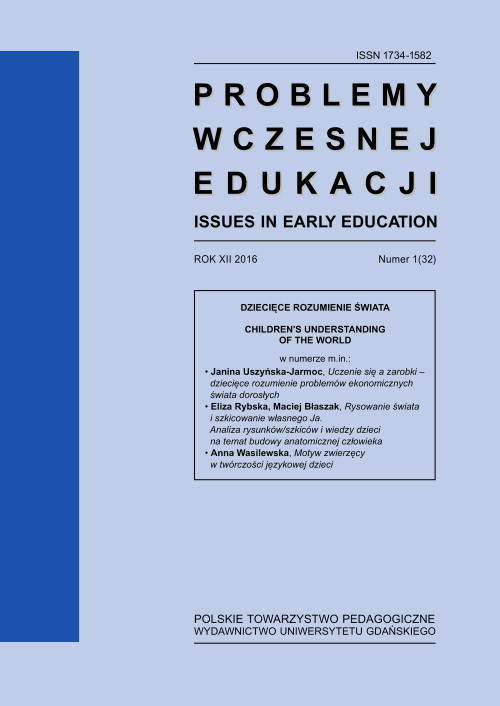Promoting children’s wellbeing in an educational context
DOI:
https://doi.org/10.5604/01.3001.0008.5643Słowa kluczowe:
wellbeing, factors influencing children's wellbeing, education, pre-school, primary schoolAbstrakt
The topicality and the context of this research are related to the phenomenon of wellbeing and factors influencing it, regarding early childhood and primary school. The aim is to study, analyse, and identify the key factors of promoting the wellbeing and healthy lifestyle of a child. Children’s wellbeing, therefore, and health and safety are more than just physical wellbeing; it should be seen holistically, as a whole welfare, and it depends not only on the environment where the child is raised, but also involves emotional support from all the people who are connected with this little human being. Thus, the first years for children at school and also for teachers (especially young teachers who have just begun their career) are a special time in their life because during this period the experience of what the child and the teacher is, and how strong and essential their connection will be, is formed. It is very important already at the early stage to understand that each child is different; they have different physical and emotional development, individual characteristics, as well as a different approach to understanding and learning things. Therefore, in the primary school it is important for the teachers to create a positive, highly social, interactive and creative environment so that the children can develop and learn more successfully. Wellbeing has a great importance in the school environment in order to create teachers’ and children’s satisfaction with life, positive relationships with others, as well as a positive and successful learning environment. The family, as well as the teachers who are involved in the development of the children’s lives, especially in the first grades at school, are one of the most essential factors that define the personal growth of the young children.
Downloads
Bibliografia
References
Argyle M. (1992), The social psychology of everyday life. London and New York, Routledge.
Diener E. et.al. (2012), Purpose, Mood, and Pleasure in Predicting Satisfaction Judgments. “Social Indicators Research”, Vol. 105, No. 3.
Erikson E. (1950), Childhood and society. New York, Norton.
Owens A. (2012), Health Safety and Wellbeing. Early Childhood Australia. National Quality Standard Professional Learning Program, e-Newsletter no. 29.
Riga City Council’s Education, Culture and Sports Department (2008), Klases audzinātāja rokasgrāmata. Rīga, Izglītības attīstības nodaļa.
Seligman M. (2002), Authentic Happiness. New York, Free Press.
Snyder C.R. and Lopez S.J. (2007), Positive Psychology: The Scientific and Practical Explorations of Human Strengths. Thousand Oaks, California, Sage Publications.
Statham J. and Chase E. (2010), Childhood Wellbeing: A brief overview. Loughborough University, Childhood Wellbeing Research Centre.
Svence G. (2009), Pozitīvā psiholoģija. Rīga, Apgāds Zvaigzne ABC.
Law
Education Law (1998) Law of the Republic of Latvia. Official Journal “Latvijas Vēstnesis” No. 343/344.
General Education Law (1999) Law of the Republic of Latvia. Official Journal “Latvijas Vēstnesis” No. 213/215.
Youth Law (2008) Law of the Republic of Latvia. Official Journal “Latvijas Vēstnesis” No. 82.
Internet resources
Neumark, V. (2014) Teachers’ Wellbeing: under Scrutiny and Underappreciated. “The Guardian”, 1 July 2014. Available at: http://www.theguardian.com/teacher-network/teacher-blog/2014/jul/01/ teachers-wellbeing-under-scrutiny-underappreciated.
State Education Development Agency (2009) Education in Latvia. Available at: http://www.viaa.gov.lv/eng/information_networks/euroguidance_eng/education_in_latvia/.

 Uniwersyteckie Czasopisma Naukowe
Uniwersyteckie Czasopisma Naukowe





